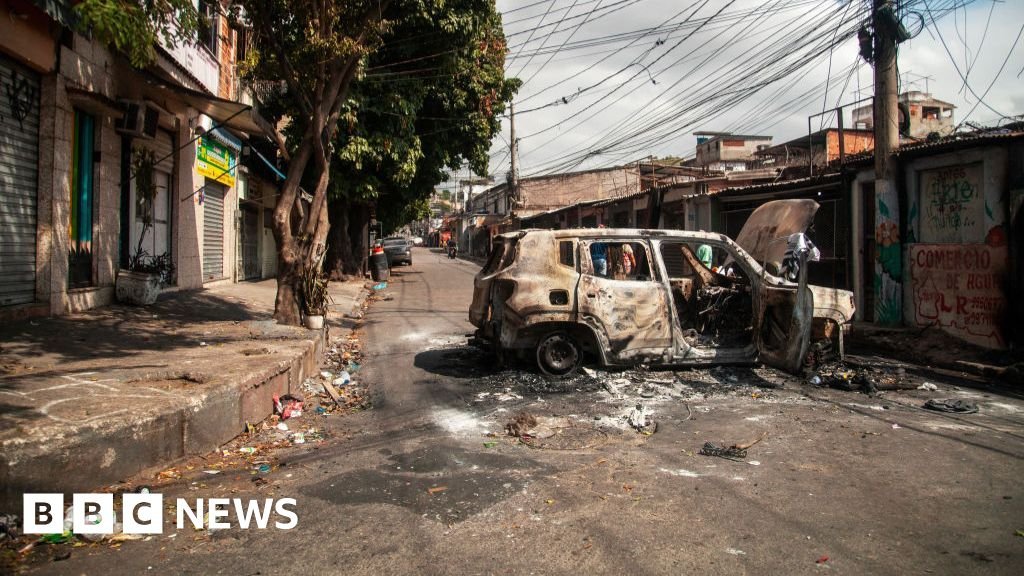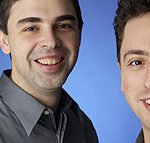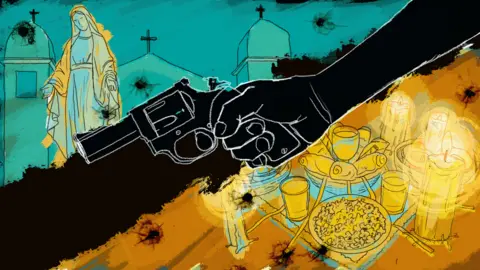 Daniel Arce Lopez/BBC
Daniel Arce Lopez/BBCWhen police in Rio de Janeiro seize blocks of cocaine and bundles of marijuana, they may well be marked with a religious symbol – the Star of David. This does not refer to the Jewish faith, but to the belief of some Pentecostal Christians that the return of the Jews to Israel will lead to the return of Christ.
The gang selling these branded drugs is the Pure Third Command, one of Rio’s most powerful criminal groups, known both for making its opponents disappear and for fanatical evangelical Christianity.
They seized control of a group of five favelas in the north of the city – now known as the Israel Complex – after one of their leaders received what he believed was a divine revelation, says theologian Vivian Costa, author of the book “Evangelical Drug.” Dealer.
She says the gangsters see themselves as “soldiers of crime,” with Jesus as “the owner” of the territory they rule.
Some have controversially called them “narco-Pentecostals.”
A gun and the Bible
One man who has experience with crime and religion – although in his case not at the same time – is Pastor Diego Nascimento, who became a Christian after hearing the gospel from a gangster with a gun.
Looking at him, it’s hard to believe that this boyish-looking 42-year-old Wesleyan Methodist minister with a smile and dimples was once a member of Rio’s notorious Red Command crime gang and led its operations in the city’s Vila Kennedy favela.
Four years in prison for drug trafficking wasn’t enough to make him give up crime. But when he became addicted to crack, his reputation in the gang plummeted.
“I lost my family. I practically lived on the streets for almost a year. I even sold things from my house to buy crack,” he says.
At that point, when he was at his lowest point, a known drug dealer in the favela called him out.
“He started preaching to me, saying that there was a way out, that there was a solution for me, which was to accept Jesus,” he remembers.
The young addict took this advice and began his journey to the pulpit.
Pastor Nascimento still spends time with criminals, but now he helps people change their lives through his work in prisons, just as he did.
Even though he was converted by a gangster, he finds the idea of religious criminals to be a contradiction in terms.
“I don’t see them as evangelical believers,” he says.
“I see them as people who are taking the wrong path and are afraid of God because they know that God is the one who protects their lives.
“There is no combination of both: being an evangelical and being a criminal. If a person accepts Jesus and follows the biblical commandments, that person cannot be a drug dealer.”
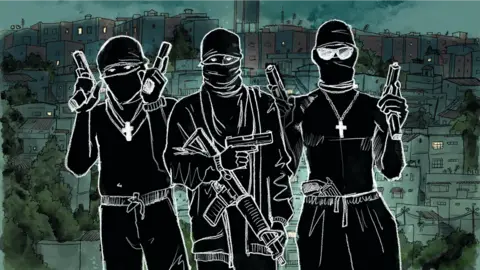 Daniel Arce Lopez/BBC
Daniel Arce Lopez/BBC“Life under siege”
According to some forecasts, evangelical Christianity will overtake Catholicism as Brazil’s largest religion by the end of the decade.
As it grew, charismatic Pentecostalism found particular appeal among people living in gang-infested favelas, and now some of those gangs are drawing on elements of the faith they grew up with to wield power.
Among other things, they are accused of using violence to suppress the Afro-Brazilian faith.
Christina Vital, a sociology professor at Fluminense Federal University in Rio, says poor communities in Rio have long been “besieged” by criminal gangs and that this is now affecting their religious freedom.
“In the Israel complex it is not possible for people with different religious beliefs to practice them publicly. It is not an exaggeration to speak of religious intolerance in this area.”
According to Vital, Afro-Brazilian Umbanda and Candomblé religious houses in surrounding neighborhoods were also closed, and gangsters sometimes painted messages on the walls such as “Jesus is the Lord of this place.”
Followers of Afro-Brazilian faiths have long faced prejudice, and drug dealers are not the only ones who have targeted them.
But Dr. Rita Salim, head of Rio’s police racial and intolerance crimes unit, says threats and attacks by drug gangs have a particularly strong impact.
“These cases are more serious because they are perpetrated by a criminal organization, a group and its leader, who instill fear in the entire territory under its control.”
She notes that an arrest warrant has been issued for the man considered the number one crime boss in the Israel complex for allegedly ordering gunmen to attack an Afro-Brazilian temple in another favela.
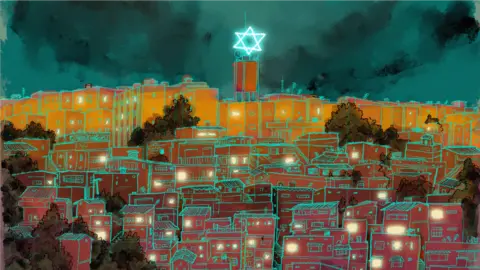 Daniel Arce Lopez/BBC
Daniel Arce Lopez/BBC“Neo-Crusade”
While allegations of religious extremism in Rio’s favelas first gained attention in the early 2000s, the problem has “increased dramatically” in recent years, according to Marcio de Jagun, religious diversity coordinator at Rio City Hall.
Jagun, a babalorixá (high priest) of the Candomblé religion, says the problem has now become a national problem and similar attacks have been seen in other Brazilian cities.
“This is a form of neo-crusade,” he says. “The prejudices behind these attacks are both religious and ethnic. Outlaws demonize religions from Africa and claim to banish evil in the name of God.”
But religion and crime have long been closely intertwined in Brazil, says theologian Vivian Costa. In the past, gangsters asked for protection from Afro-Brazilian deities and Catholic saints.
“If we look at the birth of the Red Command or the birth of the Third Command, Afro-religions (and Catholicism) have been there from the beginning. We see the presence of Saint George, the presence of the Afro-Brazilian god Ògún, the tattoos, the crucifixes, the candles, the offerings.
“Therefore, to call it narco-Pentecostalism is to reduce the very historical and traditional relationship between crime and religion. I prefer to call it ‘narco-religiosity’.”
Whatever you call this mix of faith and crime, one thing seems clear: it endangers a right enshrined in the Brazilian constitution – freedom of religion.
And it’s another way violent drug traffickers harm the communities forced to live under their rule.


